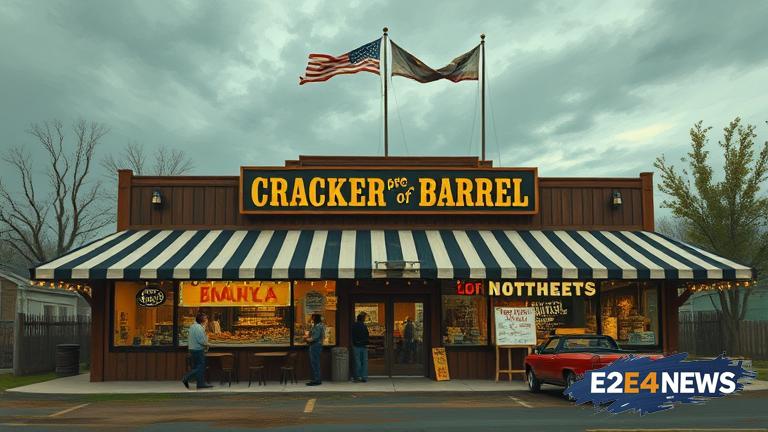Cracker Barrel, a popular American restaurant chain, has been at the center of controversy in recent months due to its rebranding efforts. However, a closer look at the company’s history reveals that its embrace of woke culture predates this change. The company has been actively promoting diversity, equity, and inclusion initiatives, which has led to a shift in its brand identity. This shift has been met with criticism from some customers, who feel that the company is abandoning its traditional values. Despite this, Cracker Barrel has continued to push forward with its woke culture initiatives, including the introduction of new menu items and marketing campaigns. The company’s CEO has stated that the goal of these efforts is to create a more inclusive and welcoming environment for all customers. However, some critics argue that this approach is alienating the company’s core customer base. The controversy surrounding Cracker Barrel’s rebranding has sparked a wider debate about the role of woke culture in business. Some argue that companies have a responsibility to promote social justice and equality, while others believe that this approach can be divisive and harmful. Cracker Barrel’s situation is not unique, as many companies are grappling with the challenges of navigating a rapidly changing social landscape. The company’s decision to embrace woke culture has been influenced by a range of factors, including changing consumer attitudes and shifting demographics. As the US population becomes increasingly diverse, companies are under pressure to adapt and reflect this diversity in their branding and marketing. However, this can be a difficult balancing act, as companies must also be mindful of the potential backlash from customers who feel that their values are being ignored. Cracker Barrel’s experience serves as a cautionary tale for companies looking to navigate the complexities of woke culture. The company’s rebranding efforts have been widely publicized, with many media outlets weighing in on the controversy. Some have praised the company’s efforts to promote diversity and inclusion, while others have criticized the approach as overly politicized. The debate surrounding Cracker Barrel’s rebranding has also sparked a wider conversation about the role of politics in business. Some argue that companies should avoid taking a stance on contentious issues, while others believe that this approach can be a key differentiator in a crowded market. As the controversy surrounding Cracker Barrel continues to unfold, it remains to be seen how the company’s rebranding efforts will ultimately impact its bottom line. One thing is certain, however: the company’s decision to embrace woke culture has sparked a lively debate about the future of business and the role of social justice in the corporate world. The company’s leadership has stated that it is committed to creating a welcoming environment for all customers, regardless of their background or identity. This approach has been reflected in the company’s marketing campaigns, which have featured a diverse range of customers and employees. However, some critics argue that this approach is not enough, and that the company needs to do more to address the concerns of its core customer base. The controversy surrounding Cracker Barrel’s rebranding has also raised questions about the impact of woke culture on the company’s brand identity. Some argue that the company’s efforts to promote diversity and inclusion have watered down its traditional values, while others believe that this approach has helped to modernize the brand and make it more relevant to a new generation of customers. As the company looks to the future, it will be important to balance the needs of its diverse customer base with the expectations of its core audience. This will require a nuanced approach that takes into account the complexities of the current social landscape. The company’s leadership has stated that it is committed to listening to customer feedback and adapting its approach as needed. This commitment to customer-centricity will be key to the company’s success in the months and years ahead. The controversy surrounding Cracker Barrel’s rebranding has sparked a wider conversation about the role of business in promoting social justice. Some argue that companies have a responsibility to use their platforms to promote positive change, while others believe that this approach can be overly politicized. As the debate continues to unfold, it remains to be seen how Cracker Barrel’s approach will ultimately impact its reputation and bottom line.
